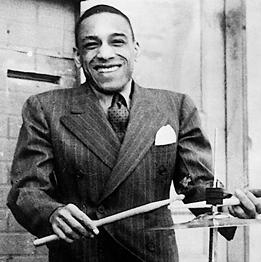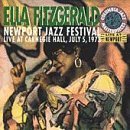Related Research Articles

Ella Jane Fitzgerald was an American jazz singer, sometimes referred to as the First Lady of Song, Queen of Jazz, and Lady Ella. She was noted for her purity of tone, impeccable diction, phrasing, timing, intonation, and a "horn-like" improvisational ability, particularly in her scat singing.
The 19th Annual Grammy Awards were held on February 19, 1977, and were broadcast live on American television (CBS). It was the seventh and final year Andy Williams hosted the telecast. The ceremony recognized accomplishments by musicians from the year 1976.

William Henry "Chick" Webb was an American jazz and swing music drummer and band leader.

Ella Fitzgerald at the Newport Jazz Festival: Live at Carnegie Hall is a 1973 live album by the American jazz singer Ella Fitzgerald, accompanied by a reconstructed Chick Webb Band, the pianist Ellis Larkins, and for the second half of the album, the Tommy Flanagan Quartet.
Between 1935 and 1955 Ella Fitzgerald was signed to Decca Records. Her early recordings as a featured vocalist were frequently uncredited. Her first credited single was 78 RPM recording "I'll Chase the Blues Away" with the Chick Webb Orchestra. Fitzgerald continued recording with Webb until his death in 1939, after which the group was renamed Ella Fitzgerald and Her Famous Orchestra. With the introduction of 10" and 12" Long-Playing records in the late 1940s, Decca released several original albums of Fitzgerald's music and reissued many of her previous single-only releases. From 1935 to the late 1940s Decca issued Ella Fitzgerald's recordings on 78rpm singles and album collections, in book form, of four singles that included eight tracks. These recordings have been re-issued on a series of 15 compact disc by the French record label Classics Records between 1992 and 2008.

Ella Fitzgerald Sings the Duke Ellington Song Book is a 1957 studio album by the American jazz singer Ella Fitzgerald, accompanied by Duke Ellington and his orchestra, focusing on Ellington's songs.

Ella and Louis Again is a studio album by Ella Fitzgerald and Louis Armstrong, released in 1957 on Verve Records. It is the sequel to their 1956 album, Ella and Louis. In contrast to their previous collaboration, this album features seven solo vocal tracks by either Armstrong or Fitzgerald amongst its dozen duet tracks. It was reissued as part of a two-compact disc set in 1995, and in The Complete Ella Fitzgerald & Louis Armstrong on Verve in 1997. It was recorded at Capitol Studios.

Clyde Lee McCoy, was an American jazz trumpeter whose popularity spanned seven decades. He is best remembered for his theme song, "Sugar Blues", written by Clarence Williams and Lucy Fletcher, and also as a co-founder of Down Beat magazine in 1935. The song hit in 1931 and 1935, in Columbia and Decca versions, and returned to Billboard magazine's Country (Hillbilly) chart in 1941. It was also played with vocals, by Bob Wills and his Texas Playboys, Fats Waller and Ella Fitzgerald.
"A Fine Romance" is a popular song composed by Jerome Kern with lyrics by Dorothy Fields, published in 1936.
"I Gotta Right to Sing the Blues" is a popular song with music by Harold Arlen and lyrics by Ted Koehler, published in 1932 for the Broadway show Earl Carroll's Vanities (1932). The song has become a jazz and blues standard. Popular recordings in 1933 and 1934 were those by Cab Calloway, Louis Armstrong and Benny Goodman.

"The Nearness of You" is a popular song written in 1938 by Hoagy Carmichael with lyrics by Ned Washington. The song debuted in the 1939 recording In the Mood by Glenn Miller and His Orchestra, with vocals by Ray Eberle.
"Don't Get Around Much Anymore" is a jazz standard written by composer Duke Ellington. The song was originally entitled "Never No Lament" and was first recorded by Duke Ellington and his orchestra on May 4, 1940. "Don't Get Around Much Anymore" quickly became a hit after Bob Russell wrote its lyrics in 1942.

Alexander Balos "Sandy" Williams was an American jazz trombonist, perhaps best known for playing with the premier big bands of his day, especially the Chick Webb orchestra. Williams also recorded extensively with Ella Fitzgerald.
"Cheerful Little Earful" is a 1930 song composed by Harry Warren, with lyrics by Ira Gershwin and Billy Rose. It was written for the musical Sweet and Low (1930). Actress and singer Fanny Brice, who was married to Billy Rose at the time, starred in Sweet and Low, where she and George Jessel sang the song. The actress Hannah Williams was known in particular for the song, "Cheerful Little Earful" in which she also performed in the Broadway production of Sweet and Low.
"I'm Old Fashioned" is a 1942 song composed by Jerome Kern, with lyrics written by Johnny Mercer.
"Stompin' at the Savoy" is a 1933 jazz standard composed by Edgar Sampson. It is named after the famed Harlem nightspot the Savoy Ballroom in New York City.
"Baby Won't You Please Come Home" is a blues song written by Charles Warfield and Clarence Williams in 1919. The song's authorship is disputed; Warfield claims that he was the sole composer of the song.
"F.D.R. Jones" is a 1938 satirical song written by Harold Rome. It was first recorded and released as a single by Ella Fitzgerald in 1938 and was performed by Judy Garland in blackface in the 1941 musical picture Babes on Broadway. The song satirizes the then contemporaneous practice of African American parents who named their children after Franklin D. Roosevelt, the 32nd President of the United States.
"I'm Making Believe" is a 1944 song composed by James V. Monaco with lyrics by Mack Gordon. The song first appeared in the film Sweet and Low-Down; the performance by Benny Goodman and His Orchestra was nominated for the Academy Award for Best Original Song. The version recorded by the Ink Spots and Ella Fitzgerald topped The Billboard's National Best Selling Retail Records chart for two weeks in 1944. Their version had sold over one million copies by the time of Fitzgerald's death in 1996.
William Beason was an American swing jazz drummer born in Louisville, Kentucky. At the height of his career, he recorded with Django Reinhardt.
References
- ↑ Leona Williams and her Dixie Band discography, redhotjazz.com
- ↑ Sara Martin discography, redhotjazz.com
- ↑ Nat Shapiro; Bruce Pollock, eds. (1969). Popular Music: 1920–1929. Popular Music: An Annotated Index of American Popular Songs. Adrian Press. p. 109.